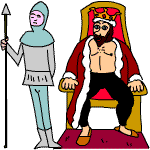Edward II - King of England
Created | Updated Mar 31, 2014

Do you remember the prince in the film Braveheart who was gay? 1 Well, he went on to become Edward II of England. He was born in 1284 in Caernarfon, Wales, son of Edward I, otherwise known as Edward Longshanks, and Eleanor of Castille. As Edward Longshanks had murdered the last Welsh Prince of Wales, Llywelyn ap Gruffydd, the baby Edward was made the new Prince of Wales. He was also the Earl of Hereford and Duke of Lancaster.
Now, Edward Longshanks was a bit of a nasty man, even by English Royalty standards, and this might have had something to do with the way his son turned out. Edward I was tough and warrior-like, while Edward II was the complete opposite. Edward II was betrothed at a very early age to the six-year-old heiress to the Scottish throne, but she died in a shipwreck on the way to the wedding. Having failed to unite England and Scotland through marriage, Edward I did it by force: which is where the story of Braveheart really starts.
Eventually Edward II was married at the age of 24 to Isabella of France, but even on his wedding night he preferred to sleep on the couch of his homosexual favourite, Piers Gaveston. Gaveston was exiled and eventually murdered - there's no proof that Longshanks ever threw him out of the window as portrayed in the film - and Isabella went on to bear two sons and two daughters. Again there is no historical proof that she ever met William Wallace, let alone slept with him.
Edward II was a very weak king who tended to rule by resorting to executing anyone who tried to stand against him. He wasted a lot of money on his homosexual lovers and was very unpopular. As a soldier, he failed to stop Robert The Bruce from regaining power in Scotland and was defeated at the battle of Bannockburn in 1314, ensuring Scottish independence until the Act of Union in 1707.
In 1324, war broke out with France2, and Isabella and their child Edward3 were sent to France to negotiate peace with her brother, the King. Instead, she met up with Roger Mortimer, one of Edward's expelled Barons, and they began an open affair. Isabella and Roger managed to raise an army and invaded England in 1326, capturing and imprisoning Edward in Bristol Castle.
The people of Bristol wouldn't put up with Edward, so he was moved to Berkeley Castle4, a small castle in Gloucestershire, England, under cover of darkness in April 1327.
Many attempts were made to kill him without violence. At Berkeley he was thrown into a waste pit and forced to eat rotten food and drink foul water. Dead animals were even thrown into the pit, but he still did not die.
In September 1327, a knight named Gurney joined Lord Maltravers as gaoler. They inserted a straight cow horn with the point removed into Edward's anus, then a red hot iron was pushed through the cow horn and into the body, burning out his entrails. This killed him while leaving no marks on his body, making it appear as if he had died of natural causes. The crime might have gone unnoticed if they had not murdered him in an outbuilding: as it was, his screams could be heard all over the village. When the crime was investigated, Thomas Berkeley produced an alibi that he was ill and staying five miles away at Wotton Under Edge. He was acquitted. In the 1600s, a historian found papers revealing that Thomas Berkeley did not attend Bradley Court, Wotton Under Edge until a week after Edward's murder. No one was ever found guilty, mainly due to Thomas Berkeley concealing Gurney and exiling him to Beverston.
Sir Richard Baker, reflecting mainly on Edward's lack of military skill and statesmanship, wrote about Edward I in A Chronicle to the Kings of England:
'His great unfortunateness was in his greatest blessing: for of four sons which he had by his Queen Eleanor, three of them died in his own lifetime, who were worthy to have outlived him; and the fourth outlived him, who was worthy never to have been born.'
In his dying moments, Edward II probably wished he had never been born too.

